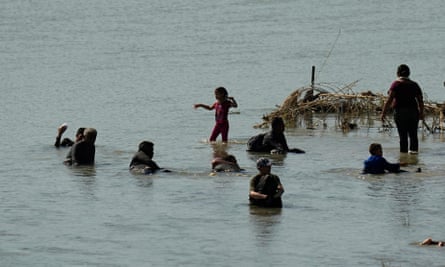Uncharted territory’: UN declares first week of July world’s hottest ever recorded
Extreme temperatures break records as scientists warn El Niño is set to get worse

“The beginning of July was the hottest week on record for the planet as a whole, according to the World Meteorological Organization. This year had already seen the hottest June on record, the UN body said, driven by climate change and the early stages of an El Niño weather pattern.
It is the latest in a series of records halfway through a year that has seen a drought in Spain and fierce heatwaves in China as well as the US.
“The world just had the hottest week on record, according to preliminary data,” the WMO said in a statement, adding that temperatures were breaking records on land and in the oceans, with “potentially devastating impacts on ecosystems and the environment”.
“We are in uncharted territory and we can expect more records to fall as El Niño develops further and these impacts will extend into 2024,” said Christopher Hewitt, WMO director of climate services.
“This is worrying news for the planet.”
Global sea surface temperatures were at record highs for the time of the year both in May and June, said Hewitt. “It is not only the surface temperature, but the whole ocean is becoming warmer and absorbing energy that will remain there for hundreds of years.”

“If the oceans are warming considerably, that has a knock-on effect on the atmosphere, on sea ice and ice worldwide,” said Michael Sparrow, chief of the world climate research programme at the WMO.
But Sparrow said El Niño’s effects would probably be felt more acutely later in the year. “El Niño hasn’t really got going yet,” he said.
Europe’s climate monitoring service Copernicus told the AFP news agency that its data also showed last week was likely to be the hottest since records began in 1940.
Copernicus said that its data suggested Thursday was likely to have seen the highest global average temperature, after several record-breaking days earlier in the week.
‘Out of control’
Along the US-Mexico border, federal agents reported that extreme temperatures over the weekend contributed to 10 people dying and another 45 people being rescued.
The south-western US is bracing for another week of blistering temperatures, with forecasters on Monday extending an excessive heat warning through the weekend for Arizona’s most populated area, and alerting residents in parts of Nevada and New Mexico to stay indoors.

The metro Phoenix area was on track to tie or to break a record set in the summer of 1974 for the most consecutive days with the high temperature at or above 110F (43C).
Last week the Canadian ministry of natural resources said the number of wildfires in the country – more than 670 on Friday – was “off the charts” with a long and difficult summer ahead.
Smoke from the fires so far this season has polluted the air in Canada and neighbouring US, affecting more than 100 million people.
In the US, Texas was experiencing a prolonged “heat dome” in which warm air is trapped in the atmosphere like a convection oven, while in Europe, Spain was bracing for its second heatwave in a matter of weeks.
In southern Iraq, the fabled marshland was having its worst heatwave in the past 40 years, the UN’s Food and Agriculture Organization said on Monday, warning of a “devastating impact” on the ecosystem as well as farmers and fisheries.

The UN secretary general, António Guterres, has said “the situation we are witnessing now is the demonstration that climate change is out of control”.
Heat-related deaths
Higher than normal temperatures also cause health problems ranging from heatstroke and dehydration to cardiovascular stress.
Research published on Monday found that more than 61,000 people died due to the heat during Europe’s record-breaking summer of 2022.
The majority of deaths were of people over the age of 80 and about 63% of those who died due to the heat were women, according to the research published in the journal Nature Medicine.
Experts say heat exhaustion and heatstroke are likely to become more common as the impacts of climate change grow more and more extreme.
Heatstroke is the most serious heat-related illness and happens when the body loses its ability to sweat.

Jon Femling, an emergency medicine physician and scientist at the University of New Mexico, said the body tried to compensate by pumping blood to the skin as a way to cool off. The more a person breathed, the more they lost fluids, becoming increasingly dehydrated.
“So one of the first things that happens is, your muscles start to feel tired as your body starts to shunt away,” he said. “And then you can start to have organ damage where your kidneys don’t work, your spleen, your liver.”
The stress on the body may result in the brain not getting enough blood, he said. With heat exhaustion, the body could also become cold and clammy. Older people, children and those with health conditions could face greater risks when the temperatures were high.”
Agence France-Presse contributed to this report
No comments:
Post a Comment
Note: Only a member of this blog may post a comment.